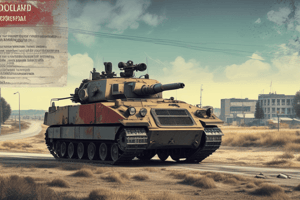Podcast
Questions and Answers
What was the primary aim of the United States' policy of containment during the Cold War?
What was the primary aim of the United States' policy of containment during the Cold War?
- To prevent the spread of Communism (correct)
- To spread democracy worldwide
- To establish military bases abroad
- To promote global trade relations
Which act was specifically enacted to limit the power of labor unions due to fears of Communism?
Which act was specifically enacted to limit the power of labor unions due to fears of Communism?
- Taft-Hartley Act (correct)
- Wagner Act
- National Labor Relations Act
- Smith Act
Who was the head of the FBI that conducted investigations into suspected Communist sympathizers?
Who was the head of the FBI that conducted investigations into suspected Communist sympathizers?
- Harry S. Truman
- J. Edgar Hoover (correct)
- Joseph McCarthy
- Richard Nixon
What did Americans fear about the spread of Communism within the United States?
What did Americans fear about the spread of Communism within the United States?
What was a significant consequence of Joseph McCarthy's actions during the Second Red Scare?
What was a significant consequence of Joseph McCarthy's actions during the Second Red Scare?
Flashcards are hidden until you start studying
Study Notes
Containment Policy
- Aimed to prevent the global spread of Communism during the Cold War.
- Implications included increased domestic surveillance and paranoia about Communist influence in society.
Understanding Communism
- Ideology focused on equitable distribution of resources based on needs.
- Joseph Stalin's regime in the Soviet Union was marked by widespread violence and oppression, contrasting with Communist ideals.
Rise of Red Scare
- Post-World War II, Americans feared Communist infiltration in their daily lives and institutions.
- J. Edgar Hoover, head of the FBI, initiated secret investigations and detentions of suspected Communist sympathizers.
Legislation and Labor Unions
- The Taft-Hartley Act was enacted to curb the influence and power of labor unions perceived as supporting Communist ideology.
Joseph McCarthy and the Second Red Scare
- Senator Joseph McCarthy intensified fears around Communism, leading to widespread reevaluation of personal and professional relationships.
- The House Un-American Activities Committee (HUAC) conducted investigations into any Americans accused of Communist ties.
Public Sentiment
- Fear of Communism was fueled by concerns that it threatened U.S. stability.
- Many Americans viewed Communism as an atheistic and violent ideology, heightening societal tensions and paranoia.
Studying That Suits You
Use AI to generate personalized quizzes and flashcards to suit your learning preferences.




